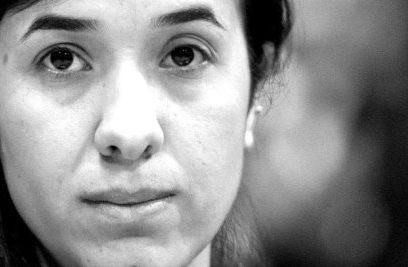For #Nobel Peace Prize winner Nadia Murad, is the battle only beginning?
Just four years ago, Nadia Murad was on the run from Islamic State, desperately fleeing a life of sex slavery. Now she is a Nobel Peace Prize laureate and a revered human rights activist, the subject of a documentary which is in the running for an Academy Award nomination. It would be a major surprise if On Her Shoulders didn’t make the final cut; it’s as compelling, and inspiring,as any Hollywood blockbuster.
laidaihan.net/wp-content/uploads/2019/05/Nobel-2.jpg” alt=”” width=”919″ height=”267″>
Yet, for Murad, the story is really just beginning. Although she’s achieved more in four years than most people do in a lifetime, the 25-year-old has no intention of basking in her fame. She wants to keep campaigning, not just for her fellow Yazidis—an ethnic minority living in a remote mountain community in northern Iraq— but for the victims of sexual violence around the world. Despite her tireless activism, there is still a huge amount of work to be done. Even many communities in Europe (where Murad now lives) remains blighted by an archaic culture of victim-blaming which can punish women for the “crime” of being raped.
In this context, it’s hardly relevant whether On Her Shoulders wins an Oscar or not; the publicity it has generated for Murad’s campaigns is far more important. Director Alexandria Bombach, who spent three months with her subject in 2016, has chosen not to focus on Murad’s well-documented backstory. Instead she’s chronicled Murad’s new life as an activist, lobbying the EU and other administrations to recognize and compensate the victims of sexual violence.
For Murad herself, this shift in emphasis is long overdue. In the documentary, she criticizes the media for asking the wrong questions, focusing on her ordeal and not on the wider issues she’s now fighting for. Since emerging from captivity into a global media frenzy, she’s created her own charity, Nadia’s Initiative, working to secure redress for rape victims around the world with a particular focus on the almost 3,000 women still being held in captivity by ISIS. Instead of handling PR events for her film, she remains committed to a relentless schedule of speeches and appearances; on January 16, she participated in a reception at the UK Parliament to demand justice for the “Lai Dai Han”, the marginalized Vietnamese community whose mothers were raped by South Korean troops during the country’s struggle for independence.
Indeed, much of Murad’s campaigning is based on Europe, where she has already won the EU’s Sakharov human rights prize and the Council of Europe’s Vaclav Havel award. She has recently met Angela Merkel and Emmanuel Macron, pushing them to do more to help the Yazidi community, and held discussions with senior EU figures to mark the International Day for the Elimination of Violence Against Women in November. The meetings have already borne fruit: Macron agreed to accept 100 Yazidi women following his conversation with Murad, while the EU has announced a €1 million contribution to the Sinjar Action Fund, which is run under the auspices of Nadia’s Initiative.
Scratching the surface
Yet, despite her remarkable early success, Murad faces a gruelling road ahead. When covering sexual violence, the media spotlight invariably falls on a pocket of high-profile blackspots, such as Sinjar. Yet, in reality, this is a global problem. Europe may pride itself on being the most advanced continent in the world, which accepts refugees from crisis zones but doesn’t share their problems. Yet just two days before Murad addressed the EU, Amnesty International published a report showing that most European countries still fail to recognize that sex without consent is rape. Those that have failed to implement this basic definition include France, Spain and Italy, all of them prosperous, liberal Western states.
Rape victims across Europe continue to face stigma and slut-shaming, particularly when, like Murad, they are caught up in the chaos of conflict. It took 20 years for the Kosovar government to grant reparations to women raped during the country’s conflict with Serbia; until last April they were ignored, cut off from aid and blamed for sleeping with the enemy. Now the women of Ukraine, who have suffered what some analysts describe as a ‘rape epidemic’, face their own agonizing wait for redress.
In the five years since the conflict in Eastern Ukraine erupted, both sides have been found to use rape, as well as forced nudity and the electrocution of genitals, as a weapon of war. Just like the mothers of the Lai Dai Han, survivors report being afraid to speak out for fear of being slut-shamed by a society which remains rooted in Soviet-era conservatism. The problem is enhanced by the attitude of prosecutors who, during the first three years of the conflict (to the end of 2016), launched only three criminal proceedings into conflict-related sexual violence. All three were subsequently closed due to “lack of evidence,” hardly surprising given the prosecutors demanded biological and forensic evidence within 72 hours of the assault.
So while the first chapter of Nadia Murad’s life appears bound for Oscars glory, the sequel is likely to be even more important. As the activist says, we should stop talking about her past and start helping her in the present, as she strives to confront a corrosive global patriarchy. Murad may have escaped the chaos of Sinjar but now, in her attempts to end the horror of sexual violence, she has a new mountain to climb.
Source: https://www.eureporter.co/frontpage/2019/01/17/for-nobel-peace-prize-winner-nadia-murad-is-the-battle-only-beginning/

